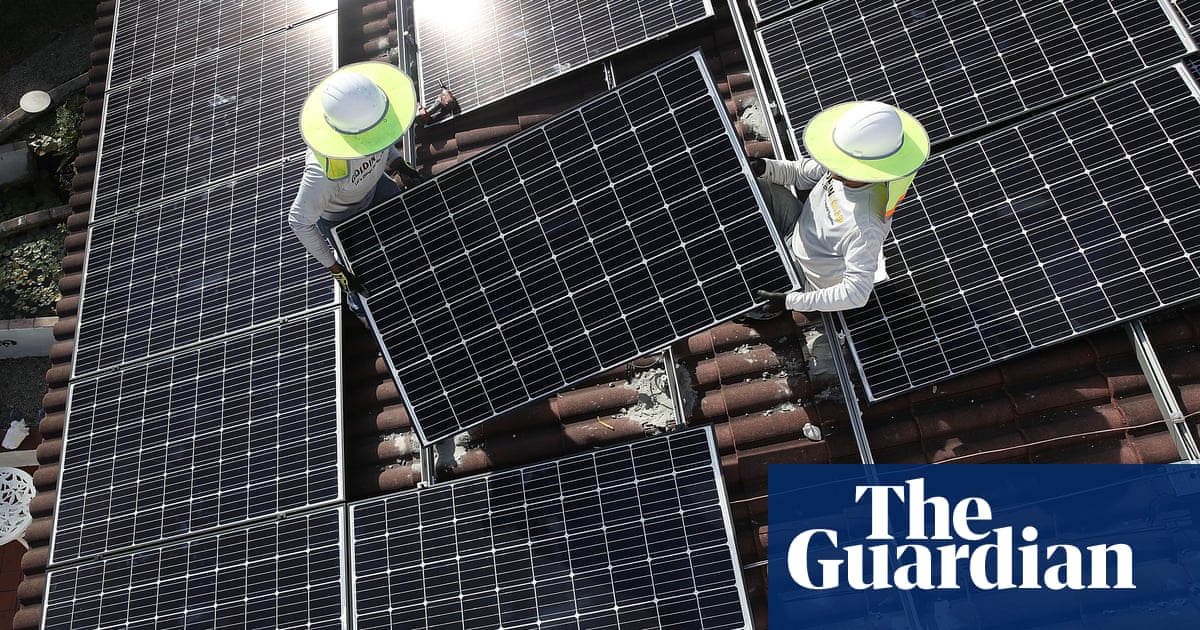Funds will be targeted at disadvantaged areas to create 200,000 jobs, after last week’s oil and gas lease restrictions in Alaska
Joe Biden will mark Monday’s Earth Day by announcing a $7bn investment in solar energy projects nationwide, focusing on disadvantaged communities, and unveiling a week-long series of what the White House say will be “historic climate actions”.
The president is traveling to Virginia’s Prince William Forest Park to deliver a speech touting his environmental record, including measures to tackle the climate crisis and increase access to, and lower costs of, clean energy.
Today’s centerpiece is the announcement of $7bn in grants through the Environmental Protection Agency’s “solar for all” program, funded by last year’s $369bn bipartisan Inflation Reduction Act, which the Biden administration says benefits more than 900,000 households.
The money will be targeted at low-income and disadvantaged areas, government officials say, and distributed through “states, territories, tribes, municipalities and non-profits across the country”.



My read is that it’s less about divestment or sanctions, and more about preserving industry capacity.
The U.S. used to have a lot of textile factories until free trade moved those jobs to other countries. And the automotive industry used to be much more U.S.-based. (It’s a bit different, because while plants did close, the major job losses and industry shifts were in sub-assemblies that get shipped to plants.)
What happens is that China is heavily subsidizing its ______ industry (solar panels, in this case). That’s why they’re so much cheaper. In addition to heavy subsidies, the Chinese yen is artificially weakened against other currencies, meaning that those currencies can buy Chinese goods more cheaply than they can goods produced domestically.
The end result is that in free trade situations, and most lightly restricted trade situations, that the Chinese goods outcompete domestic goods. This creates trade imbalances, causes domestic economic issues, and perhaps most insidiously, destroys the domestic industry. Factories owned by ‘people’ tend to go under, or wind up sold off to multi-national corporations. Either way, factories are run with leaner margins until cuts to maintenance ensure that they must close because repairing, rebuilding, or replacing is economically infeasible. Equipment is sold off, scrapped, or just goes dormant. Poorly maintained, dormant equipment that is not stored properly will likely never be able to be used again.
Buildings either continue to degrade with no maintenance or no tenants, or they get sold and repurposed.
And at that point, China moves its subsidies to other industries. Countries must buy their goods because they no longer have enough domestic producers of the goods, or the surviving domestic producers have moved into premium products, so China has cornered the market on affordable products.
It costs huge amounts of capital to spin up a factory, and factories in developed countries really only really exist because they already exist. The cost of property and tooling is often way, way too much to start a new manufacturing business, let alone the cost of skilled labor. Once a domestic industry has died or failed to launch when new products are expected to carry a premium, there are exceptionally few ways to revive that industry, aside from throwing huge amounts of money at it.
So… In this case, it’s to prevent China from smothering the U.S. nascent domestic solar panel industry. I doubt it’ll really succeed. We’ll probably wind up with a political shift and whoever is blowing in the breeze will quietly open up free trade on solar panels, or somebody will sue about the tariffs, and the courts will do something silly like declare the federal government isn’t actually a government, but is actually a hamster.